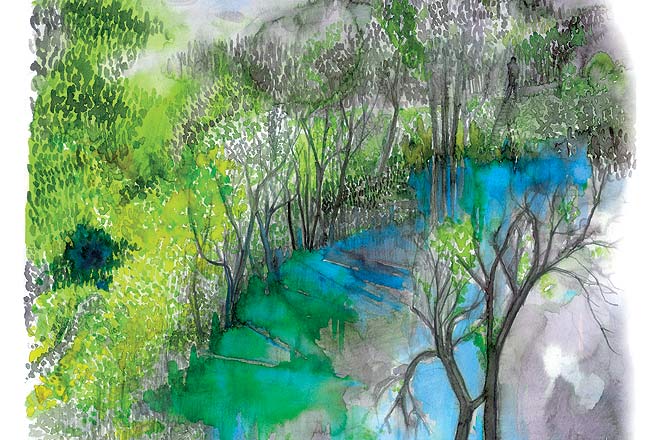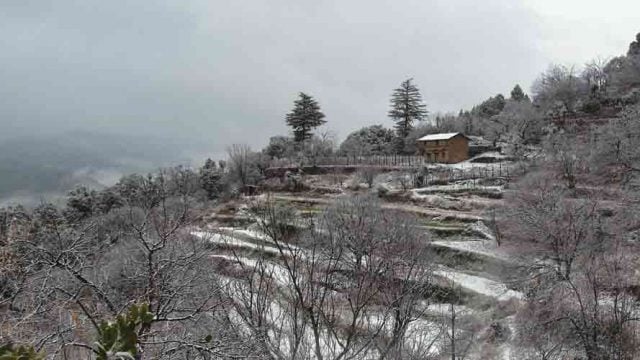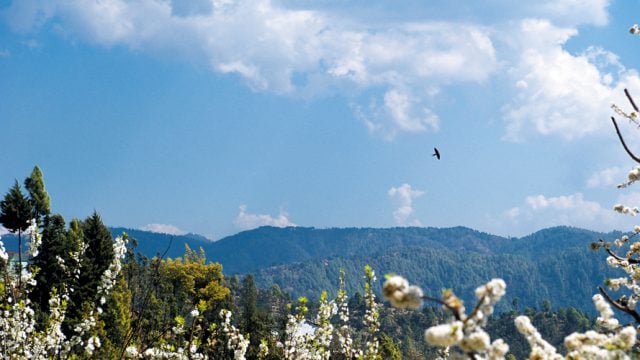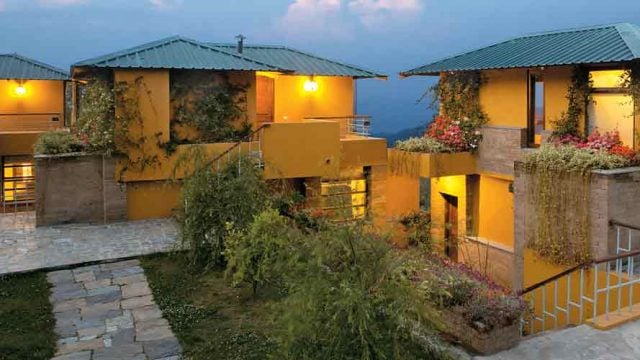Although it’s been nearly a decade since I took that first trip to the region of the
I’d never been to Nainital before, but I remembered my father’s photographs of the town and its surrounding area, old colour prints with captions scribbled in his spidery hand. I also had a vague introduction to people who ran an adventure camp, one of whom, I thought, was called Marx. Actually, his last name was spelt Marks, but he had a beard, and he was happy to see me when I got there in the early afternoon on a tour bus from Nainital. It was winter, not really tourist season. The camp was deserted except for Marks and one of his helpers, and he asked me to stay the night. Because he was rushing off to meet someone in a nearby village, he offered to take me to a nearby lake, a quiet spot slightly off the tourist trail where I could spend the afternoon.
The lake, Garud Tal, was dark and placid in the winter sun, nestling in a deep hollow, the motored road above completely invisible. A series of stone steps had been carved along one shore, facing a small altar with a cross. Apparently, there was a German Methodist colony nearby. Marks said if I wanted food or a cup of tea, I could go to the stores around the big lake, as long as I did so before five. I sat and read after they left. I scribbled in my notebook. I may have even recited poetry. The large eagles that gave the lake its name appeared occasionally above the water, gliding past a rotting wooden sign that warned swimmers about the water. It was a sylvan setting, slowing down time and bringing back the long afternoons of my childhood in the north-eastern hills. I thought of my friend and his depression, of the typewriter I had bought, and of the limitations of my job.
I was embarking on the kind of shapeless, hazy reflection that is often a prelude to actual writing, although one never quite knows this at the time. As the sun began to dip across the shore and I realised I had to go, I wondered whether I would be able to recall this setting back in Calcutta. Would I, in spite of the random notes, be able to describe this place? And even if I could, how would that give it any significance? I had been playing with the stones on the shore, and there was one that caught my fancy. It was purplish, oval, and the size of a pigeon egg, fitting snugly in my hand. I put it in my pocket, thinking that I would use it as a paperweight when I returned home, like a mnemonic device, a distillation of the place.
I began walking back, taking the little path that twisted through the trees and climbed up to the main road. But the path ended abruptly, in a thicket of plants and branches, petering out like a PWD road that has been abandoned after all the construction money has been siphoned off. Then things got really strange. There were no other paths leading away from that lake, just that one, and no matter how often I retraced my steps, it came to a dead end, as if I had flown in there instead of walking to the lake. I climbed a hill to get a view, I scrambled through the brush in the other direction only to be checked by a high barbed-wire fence, and as the trees on the top of the slopes began to blur into the dusk, I realized I would just have to wait by the lake for Marks to come looking for me.
I sat by the water, feeling a panic that had a comic quality to it because it seemed silly to be lost like this. That was when my hand touched the stone in my pocket. I had the thought, irrational and yet perfectly clear as if suggested by a wiser being, that I had no business to be removing the stone. I put it back on the ground and decided to try one last time. The same path, the same direction, the same trees, only the light a little weaker, and the path climbing up just as it had when I came down to the lake. I went to the big lake, drank tea, smoked a cigarette, and returned to the adventure camp. I didn’t tell Marks anything about getting lost.
The story could easily end at this point, since it already possesses its own logic. But the next morning, I hitched a ride on a Red Cross jeep for part of the way back. We picked up an elderly man with glasses, and in the manner of most hill people towards a stranger, he introduced himself as a schoolmaster. He was full of stories about the lakes, about the deep, mythological time they existed in. The Pandavas had roamed here during their exile, he told me, and asked me which lakes I had visited. I began to count them off as if I were a student of his — Ram-Lakshman Tal, Bhimtal, Garud Tal.
Garud Tal, he said, that’s not the proper name. And it’s not a lake one should visit alone. I asked him why it was called. Rakshash Tal, he replied. Demon Lake. I asked him if he thought it was a bad place, but he said it was not bad so much as powerful. A lot of suicides took place there. It was old, and I would find it mentioned in the Mahabharata. Do you know the story about the Pandavas and the lake? he asked.
I remembered it then, the lake where Dharma tests the Pandava brothers as they come to drink the water and where they all fail except for the fastidious, ethical Yudhisthira. “The very lake,” he said. “Perhaps that’s why it’s best not encountered alone.”
But I had encountered it alone. And I had certainly come into contact with something else, if only a strange dialectic around the idea of possession, when the stone I wanted to possess turned around and possessed me. You may not agree with this, and you may want to separate the mythological strain from the ecological, anti-capitalist veins, or cut them both out of the story. But I discovered when I returned home that I didn’t really need the stone. The lake had given me a story instead, hard and opaque, and although there is often a gathering, or a conversation late in the night, when I present my story to new listeners, it never fails to amaze me.
Nainital
Leave a Reply
You must be logged in to post a comment.





